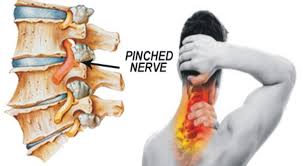
Common pinched nerve in the neck symptoms and warning signs? The problems related to a pinched nerve may be worse when you’re sleeping. When to see a doctor? See your health care provider if the signs and symptoms of a pinched nerve last for several days and don’t respond to self-care measures, such as rest and over-the-counter pain relievers. A pinched nerve occurs when too much pressure (compression) is applied to a nerve by surrounding tissues. In some cases, this tissue might be bone or cartilage, such as in the case of a herniated spinal disk that compresses a nerve root. In other cases, muscle or tendons may cause the condition. Find extra details at pinched nerve symptoms.
Electromyography (EMG). Electromyography measures the electrical impulses of the muscles at rest and during contractions. Nerve conduction studies are often done along with EMG to determine if a nerve is functioning normally. Together, these tests can help your doctor determine whether your symptoms are caused by pressure on spinal nerve roots and nerve damage or by another condition that causes damage to nerves, such as diabetes.
Pinched nerve in the neck natural remedy : The heat will relax the muscles that might be tight around a pinched nerve. Heat also increases blood flow, which can help the healing process. He suggests using a heating pad, which you’ll be able to find at your local drug store, or a warm compress. “Just as you should with ice, protect your skin from direct heat sources,” he says. “Don’t use uncomfortably hot heat, and avoid heat altogether if your skin is damaged or if you are already using a pain cream.” Hold heat directly onto the pinched nerve for 10 to 15 minutes at a time.
If a nerve is pinched for only a short time, there’s usually no permanent damage. Once the pressure is relieved, nerve function returns to normal. However, if the pressure continues, chronic pain and permanent nerve damage can occur. The following factors may increase your risk of experiencing a pinched nerve: Sex. Women are more likely to develop carpal tunnel syndrome, possibly due to having smaller carpal tunnels. Bone spurs. Trauma or a condition that causes bone thickening, such as osteoarthritis, can cause bone spurs. Bone spurs can stiffen the spine as well as narrow the space where your nerves travel, pinching nerves.
If you can’t get an official standing desk, you might try turning your current desk into one by putting your laptop or computer monitor on a stack of books. Another option is to be diligent about getting up and taking a walk to the water cooler or bathroom each hour. Reposition your keyboard: On the topic of work stations: If your pinched nerve (or pain) is located in your wrist or forearm, consider adjusting the position of your keyboard. Ideally, your keyboard should be positioned so that your elbows are in line with your wrist. This means your wrists aren’t reaching down or up to type-type-type.
How common is cervical radiculopathy? Cervical radiculopathy is somewhat common. Cervical radiculopathy affects approximately 85 out of 100,000 people. In over half of cervical radiculopathy cases, the C7 nerve root is affected. Approximately a quarter of cases affect the C6 nerve root. Because of this, the neurological symptoms that result from cervical radiculopathy can radiate down from your neck to any one of or a combination of these body parts, depending on which nerve root is affected. Cervical radiculopathy typically only affects one side of your body — for example, your right arm, not both arms.